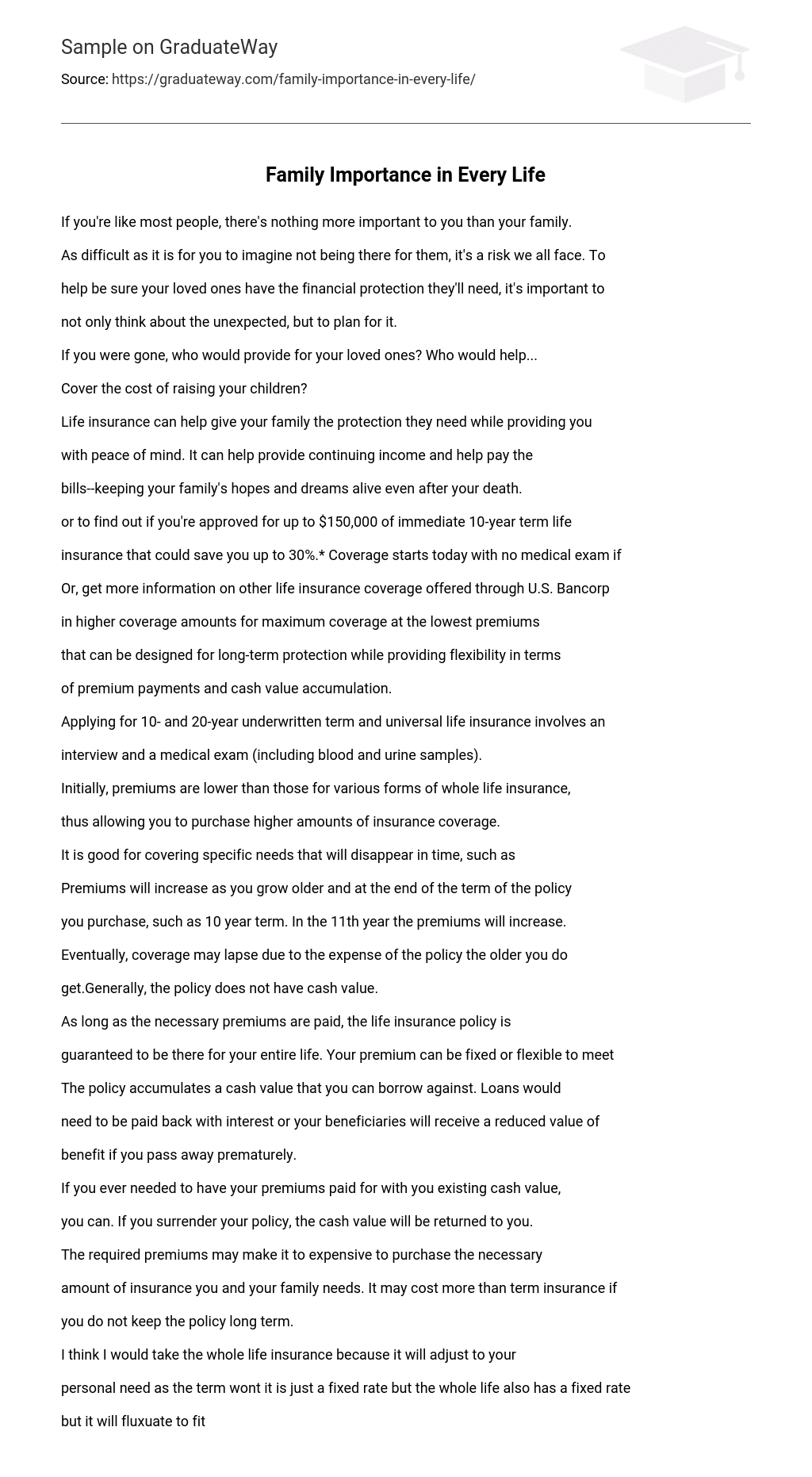If you prioritize your family above all else, understanding the importance of being there for them, it is crucial to plan for unforeseen circumstances to ensure their financial protection. Life insurance can offer security and peace of mind by providing a source of income and covering expenses if something were to happen to you. This ensures that your family’s hopes and dreams continue even after your passing.
Additionally, you have the opportunity to see if you qualify for immediate 10-year term life insurance up to $150,000 with potential savings of up to 30%. You can begin coverage today without requiring a medical examination. Alternatively, U.S. Bancorp offers alternative life insurance options that provide higher coverage amounts at affordable premiums for maximum protection. These options also allow flexibility in terms of premium payments and cash value accumulation.
When applying for underwritten term and universal life insurance with durations of 10 or 20 years, an interview and medical exam are necessary, including blood and urine samples. In the beginning, the premiums for this type of insurance are lower compared to whole life insurance, allowing you to purchase higher amounts of coverage. It is suitable for specific needs that will eventually disappear, like those covered by a 10-year term policy.
However, as you age and reach the end of the policy term, such as in the 11th year, premiums will increase. This may lead to lapses in coverage due to the increasing cost when you get older. Generally speaking, this policy does not have cash value but guarantees coverage for your entire life if you continue paying the required premiums.
Your premium can be either fixed or flexible depending on your needs. Additionally, the policy accumulates a cash value that can be borrowed against.
When you take out a loan, you are obligated to repay it with interest. If you pass away early, your beneficiaries will receive a reduced benefit. However, if your policy holds enough cash value, you can utilize it for premium payments. Should you choose to surrender the policy, the cash value will be refunded.
The required premiums may be too costly to afford adequate insurance coverage for yourself and your family. Moreover, retaining the policy for a brief period could result in higher costs compared to term insurance.
In my perspective, whole life insurance is preferable as it can be adjusted based on specific needs, whereas term insurance has a fixed rate. The rate of whole life insurance can vary depending on changing requirements at any given time, which is why I favor it.
Your family is likely the most crucial aspect of your life and envisioning not being there for them is challenging; nevertheless, this risk is encountered by all of us.
Planning for unexpected events is crucial to guarantee the financial security of your loved ones. It’s important to consider who would support your family and cover the expenses of raising your children in case something happens to you. Life insurance offers peace of mind by providing the necessary protection for your family, ensuring a continuous source of income and assisting with bill payments. This keeps your family’s aspirations alive even after you’re gone. You may qualify for immediate 10-year term life insurance worth up to $150,000 without needing a medical examination, saving you up to 30%. This coverage starts today. Alternatively, U.S. Bancorp offers other life insurance options that provide higher coverage amounts at lower premiums. These options can be customized for long-term protection with flexibility in premium payments and cash value accumulation.
When applying for 10- or 20-year underwritten term and universal life insurance, an interview and medical exam are required, which includes providing blood and urine samples. Initially, the premiums for this type of insurance are lower in comparison to various forms of whole life insurance. This allows you to purchase higher amounts of insurance coverage, benefiting specific needs that will eventually disappear over time (such as a 10-year term policy).
Following the initial period, the premiums will increase as you age. Once the policy term concludes (e.g., after 10 years), the premiums will start rising. Eventually, the cost may become too high and could result in a lapse of coverage as you grow older.
In general, this policy does not accumulate cash value. However, lifelong coverage is guaranteed as long as you continue making the necessary premium payments.
Whole life insurance offers the flexibility to meet your needs, whether you prefer fixed or flexible premiums. With this policy, you can build a cash value that is accessible for borrowing. However, if you borrow against the cash value, it must be repaid with interest; otherwise, your beneficiaries will receive a reduced benefit in case of premature death.
In addition, if you have sufficient existing cash value, it can be utilized towards premium payments. In the event of policy cancellation, the cash value will be refunded to you.
It’s important to note that required premiums may be unaffordable for adequate coverage. Compared to term insurance which has a fixed rate and may cost less over time if not held for long durations, whole life insurance adjusts according to your personal needs.
This adaptability makes whole life insurance superior in my opinion as it can cater to your ever-changing requirements unlike term life insurance.





